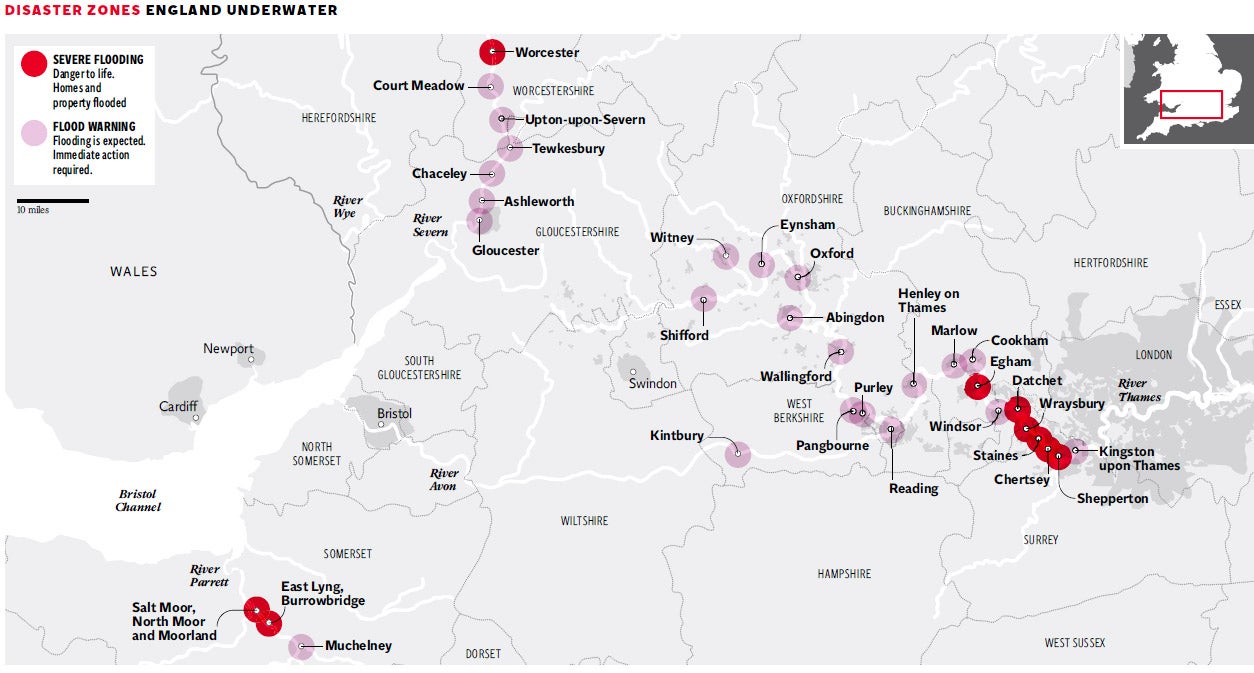UK weather: Britain’s water torture is here to stay until May
PM warns that flooding will get worse as insurers told to honour payouts to victims

The flooding crisis will get worse before it gets better, David Cameron has admitted as stricken communities were warned that the waters may not recede until May.
After returning from visiting the worst-hit areas in the South-west and along the Thames, the Prime Minister said the country was "in for the long haul" to repair the storm damage wrought by the wettest winter since the 18th century.
Click image above to enlarge graphic
He pledged "money would be no object" in the drive to restore normal life to flood-hit towns and villages and vowed the Government would "go after" insurance companies which failed to pay out to householders whose properties had been wrecked.
Risking claims that the Government is rewarding the reckless, he said people without proper insurance would be entitled to emergency help to repair their homes through "hardship funds".
He said: "That is where every local authority affected needs to have a hardship fund, and if there is a need to top up those hardship funds then they can come to us and we can have a look at that."
Some 1,000 properties, including 800 along the Thames, have been flooded in recent days, with thousands more at risk. Attention is also focusing on properties alongside the Severn and Wye where waters are rising rapidly. Large sections of Worcester, which is on the Severn, were under water.
Calling for a "great national effort" to respond to the emergency, Mr Cameron said thousands more troops could be drafted in to bolster flood defences and protect homes, businesses and power supplies.
But with yet more rain forecast today in southern England and Wales, the Prime Minster conceded it would take a "depressingly long period of time" for affected areas to return to normal. "There's absolutely no sign of this threat abating. Things may well get worse before they get better," he told a hastily-arranged press conference in Downing Street.
And he warned: "It will be a long haul and it will require a stepped-up national effort with the whole country pulling together."
The Prime Minister said homeowners would be given taxpayer-funded grants to build flood protection measures around their properties. He challenged insurance companies to "pay up fast" and warned they would they would be taken to task by the Government if they delayed payments.
Flooding in England
Show all 20The Prime Minister tore up his schedule over the last 48 hours, including postponing today's planned cabinet meeting, to take charge of the response to the emergency following accusations that ministers too slow to react to the flooding.
He announced he was cancelling a planned visit to the Middle East next week to focus on the crisis. Ed Miliband, the Labour leader, is expected to follow suit and scrap a planned visit to Asia.
Further rainfall is expected today in the South-west of England and across Wales, along with winds that could reach up to 80mph. In addition, groundwater could turn to ice as temperatures drop.
Sixteen severe flood warnings were in place tonight, 14 along the Thames and another two in the Somerset Levels. The Environment Agency has also announced 133 flood warnings and 225 flood alerts.
In some parts of England the water table has reached record levels following the extreme rainfall in recent weeks and ancient buried rivers could start to flow, causing flooding in communities which are miles from major rivers. The British Geological Survey said parts of the Thames Valley in Wiltshire, Oxfordshire and Berkshire were at risk of localised flooding until May.
Andrew McKenzie, a water expert with the survey, said: "What we saw [in the floods] of 2000-2001 was groundwater flooding persisting well into the spring and the last remnants of groundwater flooding finished in about May of 2001. So we certainly are expecting to see many more months of groundwater issues."
Hundreds of troops have been already been deployed to help residents flooded out of their homes.
In Shepperton, Surrey, an elderly doctor was rescued from his home after being trapped without electricity for three days after the level of the Thames rose dramatically.
Emergency shelter for residents flooded out of their homes in Chertsey was set up at the Thorpe Park theme park in Surrey.
Upstream in the Berkshire town of Datchet, fire officers came to the aid of Joy Levinson and her pet dog after her home became surrounded by water. She said: "We've got 10 acres of fields and it's like a lake."
Visiting the flood-hit village of Wraysbury, where the army was deployed to distribute sandbags, Mr Miliband told The Independent the response from the military and Environment Agency had taken "too long" for some residents.
He said: "There’s been a fantastic effort by local people here, but this is a wake-up call to the issues of flooding, the impact of climate change and the Government’s policy on flood prevention."
Speaking to reporters and residents while ankle-deep in floodwater, the Labour leader added that Government response to the flooding crisis had been "too slow" and that Prime Minister David Cameron "needed to get to grips with the situation".
Mr Miliband postponed a visit to India next week because of the floods. A Labour source said: "He felt that given what is happening in the country he needed to be here."
Subscribe to Independent Premium to bookmark this article
Want to bookmark your favourite articles and stories to read or reference later? Start your Independent Premium subscription today.

Join our commenting forum
Join thought-provoking conversations, follow other Independent readers and see their replies